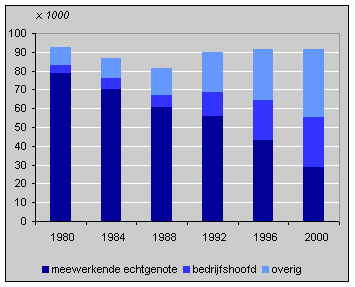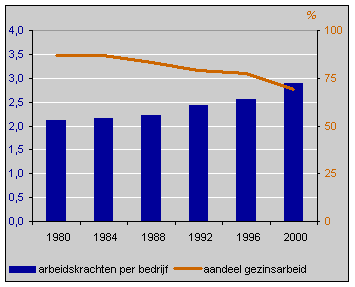One quarter of farmers' wives are also full business partners

Dutch farmers’ wives work on the farm alongside their husbands on six out of ten farms in the Netherlands. These women are increasingly also full partners in the business, which means they are also accountable for the operational management of the farm.
In the nineties many family farming businesses opted for the legal form of a business partnership for the operation of their businesses, a trend stimulated by the tax advantages of the husband-wife partnership. This meant that the wives of the farmers became a full partner in the business instead of being just a family worker.
In 1980 there were fewer than 5,000 female heads of farm businesses. Today there are nearly 27,000. The number of wives who participate as family workers fell from 79,000 to 29,000 in the same period.
Working women on agricultural and horticultural businesses

The increase in the number of female partners in farming businesses was much slower than the decrease in the number of wives working as family workers. This is mainly because the number of farms has dropped sharply in the last twenty years. The labour participation rate of farmers’ wives remained at the same level in this period. Wives work alongside their husbands on some 60% of Dutch farms.
More work on farms
The average Dutch farm has become larger in recent years. This means more land, more capital and also more work. Not all the extra work that this has expansion generated can be accommodated by using larger machines or contracting out more work.
In 1980 an average farm or horticultural business had work for 2.1 workers, in 2000 this had risen to nearly 3 workers. The extra capacity needed is increasingly found among family members. In 1980 nine out of ten people who worked on the farm regularly were family workers. Today, this share is two-thirds. Apparently the traditional family farms are losing ground.
Work on agricultural and horticultural businesses

Cor Pierik